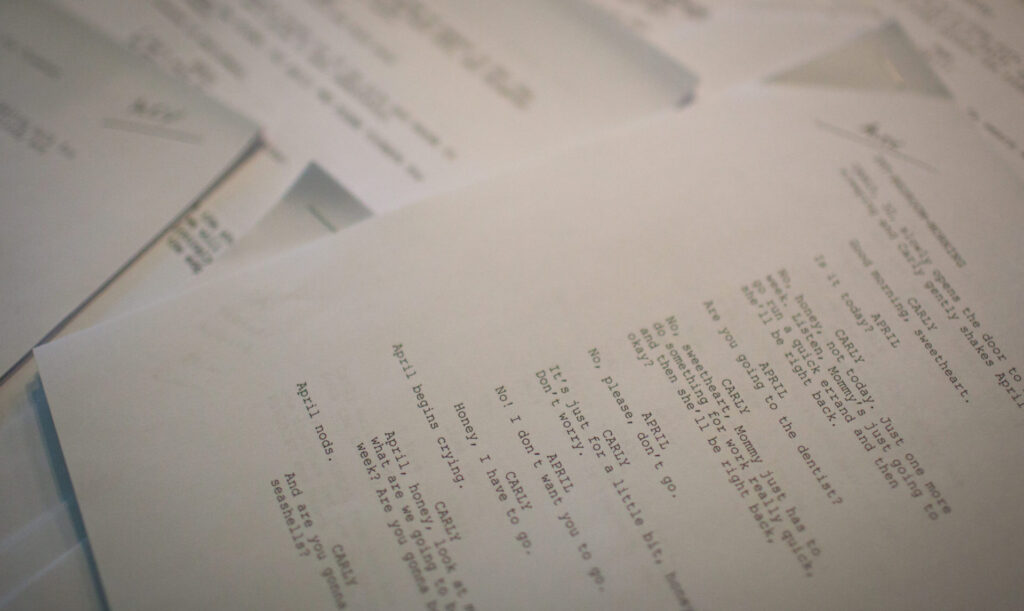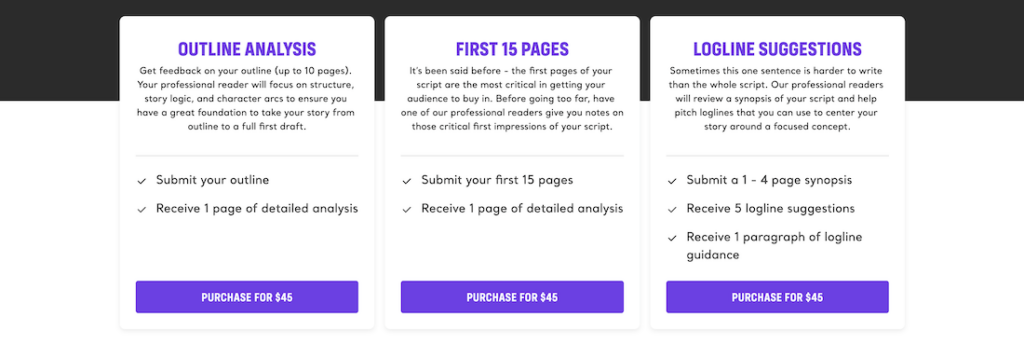Why Genre-Specific Notes Are Better

Feedback is a vital part of the beginning of your screenwriting journey—and there’s no better feedback than script coverage written by consultants and script readers with years of industry experience writing professional script coverage.
Within script coverage are notes that offer an analysis of your screenplay through the eyes of Hollywood and how they view, judge, dismiss, and embrace screenplay submissions.
These notes can make or break the future success of your screenplays and can offer you eye-opening insights into the directions you can take for further drafts so you can stand out amongst the thousands of other submissions in the current script market.
You can go to many places for professional script coverage:
- Individual scripts consultants
- Script coverage services
- Script notes via screenplay competitions, contests, and fellowships
What Are Script Notes?
Script notes consist of the analysis of your screenplay, written by a script consultant or script reader with industry experience in writing script coverage. Script coverage is the collection of script analysis that also includes (beyond the notes) a logline of your script, a synopsis of your story, and a grading system for both the script as a whole, as well as particular elements of your script (concept, characters, pacing, theme, etc.).
Read More: What Is Script Coverage?
The notes part of the script coverage document tasks the script consultant or script reader with breaking down the industry perspective of your script. Script notes will detail:
- What works within your script
- What doesn’t work
- The strengths
- The weaknesses
- Suggestions on how to better the script for the spec script market
Now, there’s a difference between the script notes you get from script coverage you’ve paid for via a service (or receive through added costs when submitting your scripts to competitions, contests, and fellowships) and the script notes you receive while under contract with a studio, network, streamer, or production company.
Script Consulting Services
When you receive script notes from a service you’ve paid for, the notes you get are educated advice on how the industry will likely perceive your work, and how you can better impress industry insiders when you submit your scripts for consideration.
In short, you aren’t required to apply them to your rewrites. You should, at the very least, consider every script note you receive from this type of script coverage. But you’re not beholden to the suggested changes.
Script Notes You Receive While Writing on Contract
When you’re under contract writing a script for someone—or doing a contracted rewrite of a script you sold to a company or producer—the script notes you receive are meant to be applied. They are given to you to make the changes necessary for the script to be greenlit for production. They are, for the most part, non-negotiable.
You can and should use your writing talents and instincts to detect possible missteps found within the script notes you receive—but you need to choose your battles wisely with the understanding that, in the end, the script isn’t yours. It’s theirs. And they will have necessary needs and wants—sometimes beyond what you agree with. Your job as a contracted screenwriter is to apply the needs and wants of your employer.
Read More: Explaining All the Different Types of Script Coverage
How Are Regular Coverage Service Script Notes Written?
Some services will provide script coverage similar to coverage written by professionals on the studio level. You’ll get:
- A breakdown of your story to prove they’ve read it
- Graded on a scale of Pass, Consider, and Fail, replicating studio-level coverage
- A few pages of script notes
Coverage services employ script readers and script consultants with industry experience who will handle a wide variety of submissions that fall under the whole gamut of film and television genres:
- Action Adventure
- Horror
- Thriller
- Suspense
- Comedy
- Drama
- Science Fiction
- And all of the subgenres branched off from those.
While you’re getting great coverage from these people, you still can’t escape the element of personal preference when it comes to what they have a background in and preference for.
This is where genre-specific notes come into play.
What Benefits Do Genre-Specific Notes Offer Screenwriters?
Think about it. When you send your email queries to production companies, you’ve hopefully done the research and learned which companies are making your types of scripts—namely the genre they fall under. So, whoever is reading your script on their end generally has an eye for certain genres and types of screenplays.
That is who you want for script notes and coverage—someone who specializes in the genre of your script. You immediately eliminate any bias against—or personal preference of—any genre because the script service will assign genre-specific consultants and readers to each script.
- Action adventure scripts will be analyzed by consultants with an action background
- Horror scripts will be analyzed by consultants with a background in the horror genre
- Comedy scripts will be analyzed by those who have worked with companies that make comedies
- Drama scripts will be covered by consultants who specialize in that genre
- Science fiction scripts will be analyzed by sci-fi specialists
The notes you'll get back will still encompass every element of your screenplay. However, the consultant will offer more detailed insights specifically tailored to the genre of your script.

This practice helps to ensure that when you do take your script to the right production companies and producers, it will have already been filtered through a similarly-minded individual within the industry—someone well-versed in your script’s genre.
Receiving genre-specific notes mirrors the script submission process the most:
- You’re sending your script to a veteran of the genre
- The script is going to be read and analyzed within the context of the genre
The genre-specific notes you receive will help you to navigate the dynamics of that genre from the perspective of the industry. Consultants will be able to guide you through the wants and needs of those seeking out genre scripts like yours. They’ll be able to help you cater to the companies and producers who are a perfect match for your script.
That is the power and benefit of genre-specific notes — the ability to be judged, reviewed, and analyzed more fairly (and more specifically) than you would from a service gives their script consultants and script readers multiple scripts written under multiple genres.
Read More: What Screenwriters Are Up Against in Every Genre
CHECK OUT OUR PREPARATION NOTES SO YOU START YOUR STORY OFF ON THE RIGHT TRACK!
Ken Miyamoto has worked in the film industry for nearly two decades, most notably as a studio liaison for Sony Studios and then as a script reader and story analyst for Sony Pictures.
He has many studio meetings under his belt as a produced screenwriter, meeting with the likes of Sony, Dreamworks, Universal, Disney, Warner Brothers, as well as many production and management companies. He has had a previous development deal with Lionsgate, as well as multiple writing assignments, including the produced miniseries Blackout, starring Anne Heche, Sean Patrick Flanery, Billy Zane, James Brolin, Haylie Duff, Brian Bloom, Eric La Salle, and Bruce Boxleitner, the feature thriller Hunter’s Creed, and many Lifetime thrillers. Follow Ken on Twitter @KenMovies and Instagram @KenMovies76
Get Our Screenwriting Newsletter!
Get weekly writing inspiration delivered to your inbox - including industry news, popular articles, and more!
































